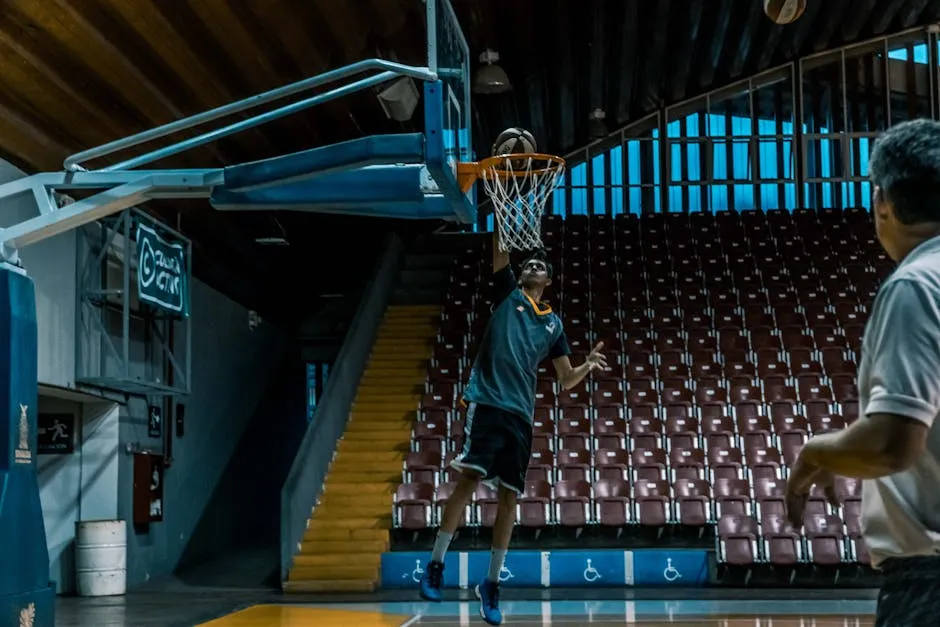Introduction
The Germany men’s national basketball team, affectionately known as “Die Mannschaft,” has carved an impressive niche in international basketball. Formed in 1934, this team has evolved significantly over the decades. From their shaky beginnings to emerging as a formidable force in global competitions, Germany has a rich history that reflects both growth and resilience.
Historically, the team made their debut at the 1936 Olympic Games in Berlin, where they faced Switzerland in a match that marked the start of their journey. Over the years, Germany’s basketball prowess has surged, highlighted by their first major triumph at EuroBasket 1993, where they clinched gold on home soil. The team’s journey has been peppered with ups and downs, but recent performances showcase a resurgence in their capabilities, particularly highlighted by their gold medal victory at the 2023 FIBA World Cup.
This article aims to provide a deep dive into the statistics of the Germany men’s national basketball team, including an analysis of their roster and major achievements. We will explore the team’s history, competitive milestones, and standout players who have left an indelible mark on the sport.
To navigate through the insights, the article is structured into several key sections, starting with a comprehensive overview, followed by current player statistics, historical performance, and recent highlights. Buckle up, basketball fans; we’re about to shoot for the stars!

Team Overview
History and Background
The Germany men’s national basketball team was officially established in 1934 when they joined FIBA, the sport’s governing body. Over the years, they’ve gone through several historical milestones. After World War II, the team was banned from international competitions until 1950. Interestingly, for a time, West and East Germany had separate teams until their reunification in 1990. Their first major competition as a unified country was the 1992 Olympics, where they reached the quarter-finals.
As of August 2024, Germany boasts a FIBA ranking of 3, a position they have worked hard to achieve. Their ranking has seen fluctuations but generally reflects their growing reputation on the global stage. The team has steadily climbed the ranks, signaling their commitment to development and success.

Competitive Achievements
Germany’s competitive achievements are a testament to their hard work and talent. The team has participated in the FIBA World Cup seven times, with a notable gold medal win in 2023 and a bronze medal finish in 2002. Their EuroBasket history is equally impressive, having secured gold in 1993, silver in 2005, and bronze in 2022.
The contributions of legendary players have significantly impacted Germany’s success. Dirk Nowitzki, often hailed as one of the greatest European players, led the charge for many years. His influence helped elevate the team’s profile on the world stage. In recent years, Dennis Schröder has emerged as a dynamic leader, showcasing his skills and determination in crucial matches, especially during the 2023 World Cup and the most recent Olympic Games.
With a blend of historical significance and modern talent, the Germany men’s national basketball team stands as a beacon of hope and excitement for fans and aspiring players alike. The legacy continues to grow as they prepare for future competitions and aim for even greater heights.
If you’re looking to bring the excitement of basketball to your driveway, consider getting a Basketball Hoop for Driveway. It’s perfect for practicing your three-pointers or just showing off your skills to friends and family!

Current Roster and Player Statistics
2024-2025 Season Roster
The Germany men’s national basketball team is gearing up for an exciting season with a robust roster. This year, they bring together a mix of experienced players and fresh talent, all aiming to make their mark on the international stage. Here’s the lineup for the 2024-2025 season:
1. Dennis Schröder (PG, 1.81 m, Brooklyn Nets) The team captain and seasoned NBA player, Schröder is known for his lightning-fast dribbling and playmaking skills. Last season, he averaged 17.2 points and 7.5 assists per game.
2. Franz Wagner (G/F, 2.08 m, Orlando Magic) A rising star, Wagner is celebrated for his versatility and scoring ability. He contributed significantly with 18.5 points per game, showcasing his knack for crucial shots during tight matches.
3. Moritz Wagner (F/C, 2.11 m, Orlando Magic) The elder Wagner sibling, Moritz, brings size and strength to the frontcourt. He averaged 9.8 points per game last season, providing valuable support on both ends of the court.
4. Daniel Theis (F/C, 2.03 m, New Orleans Pelicans) Known for his rebounding prowess, Theis averaged 7.0 rebounds per game. His defensive skills make him a core player in the paint.
5. Johannes Voigtmann (C, 2.11 m, EA7 Emporio Armani Milan) Voigtmann is a formidable presence in the low post, contributing both defensively and offensively. His height and skills make him an essential part of the team’s strategy.
6. Andreas Obst (SG, 1.91 m, Bayern Munich) Obst is known for his sharpshooting ability, particularly from beyond the arc. He’s a key player for stretching defenses and creating space.
7. Isaac Bonga (SF, 2.04 m, Bayern Munich) With his length and defensive capabilities, Bonga adds depth to the team. He’s still developing his offensive game but possesses immense potential.
8. Oscar da Silva (PF, 2.06 m, Bayern Munich) Da Silva, a versatile forward, is coming into his own with a solid performance in recent games, adding both scoring and rebounding to his repertoire.
9. Nick Weiler-Babb (G, 1.96 m, Bayern Munich) Weiler-Babb is known for his defensive tenacity. He plays a crucial role in guarding opposing players and making disruptive plays.
10. Johannes Thiemann (PF, 2.05 m, Gunma Crane Thunders) Thiemann is another strong forward option, providing energy off the bench and contributing to defensive efforts.

Key Player Statistics
Points Leaders
The Germany team has some serious scoring talent, led by Franz Wagner and Dennis Schröder. Their statistics from the latest season are impressive:
– Franz Wagner: Averaged 18.5 points per game (PPG) with a field goal percentage (FG%) of 46.6%.
– Dennis Schröder: Contributed 17.2 PPG, showcasing his shooting prowess with an FG% of 45.8%.
Other notable scorers include Moritz Wagner, who averaged 9.8 PPG, rounding out a diverse scoring attack. Their ability to sink shots from various areas of the court makes them a nightmare for defenses.

Rebounds Leaders
Rebounding is crucial in basketball, and Germany has some key players to secure those boards:
– Daniel Theis: Averaged a solid 7.0 rebounds per game, demonstrating his strength in the paint.
– Franz Wagner: Not just a scorer, he also grabbed 5.8 rebounds per game, adding to his value as a versatile player.
– Johannes Voigtmann: Contributed with 4.3 rebounds per game, providing necessary support on the boards.
These players’ rebounding abilities ensure that Germany can maintain possession and limit second-chance opportunities for opponents.

Assists Leaders
Assists are the lifeblood of any successful offense, and Germany’s top playmakers shine here:
– Dennis Schröder: Led the team with an impressive 7.5 assists per game, orchestrating the offense with his keen court vision.
– Franz Wagner: Also contributed with 2.5 assists per game, showing he can facilitate as well as score.
– Moritz Wagner: Added 2.0 assists per game, making him a valuable asset in setting up scoring opportunities.
Schröder’s leadership in this category is vital, as his ability to distribute the ball keeps defenses guessing and opens up scoring chances.

Individual Performance Highlights
The 2024 Olympics showcased some phenomenal performances from the Germany men’s national basketball team. Here are a few standout moments:
– Franz Wagner: Dominated in several games, scoring a season-high 27 points against Japan in a preparation match. He also recorded 8 rebounds and 2 assists during this commanding performance.
– Daniel Theis: Had a notable game against France, where he secured 11 rebounds, showcasing his tenacity despite a narrow loss.
– Dennis Schröder: Achieved a season-high of 12 assists in a thrilling home win against Japan, complemented by 13 points, highlighting his dual-threat ability.
– Oscar da Silva: Showed his defensive skills with a season-high of 5 steals in a hard-fought match against France.
These performances not only contributed to the team’s success but also demonstrated the individual capabilities of Germany’s players, setting the stage for a promising future in international basketball. The fans can look forward to more electrifying moments as the team continues to develop and compete.

Historical Statistics
Overall Team Performance
The Germany men’s national basketball team has shown significant growth in recent years. Analyzing their average points, rebounds, and assists per game reveals a team that has honed its skills on the international stage.
In the 2023 FIBA World Cup, Germany averaged an impressive 93.0 points per game, a notable increase from 82.7 points in the previous tournament. This surge in scoring showcases their offensive capabilities, a testament to the team’s evolution. The team also recorded an average of 37.6 rebounds per game, up from 32.2 in earlier competitions. This improvement highlights their commitment to controlling the boards, a crucial aspect of winning games.
Assists have been another area of progress. In the 2023 World Cup, Germany averaged 23.3 assists per game, compared to 19.2 in the 2022 EuroBasket. This uptick indicates a more cohesive unit, with players sharing the ball effectively, leading to higher scoring opportunities.
Comparing these statistics to past performances, it’s clear that Germany has made strides. For instance, their points per game have steadily climbed from 75.0 in the 2019 FIBA World Cup. This upward trend reflects a more aggressive and efficient offensive strategy.
With each tournament, the team’s average rebounds have fluctuated, but the recent uptick suggests a renewed focus on this critical area. The assists per game have also improved, suggesting players are working together more efficiently, leading to better shot selections.

Major Tournament Statistics
Germany’s statistics in major tournaments, particularly the 2023 FIBA World Cup and the 2024 Olympics, illustrate their competitive edge.
In the 2023 FIBA World Cup, Germany finished first, solidifying their place as a basketball powerhouse. They faced tough opponents, including the USA and Serbia. Against the USA, they secured a thrilling victory, winning 113-111 in the semi-finals. This match was pivotal, showcasing their grit and determination. The scoring leaders for Germany in the tournament were Dennis Schröder and Franz Wagner, both averaging over 17 points per game.
Transitioning to the 2024 Olympics, Germany reached the quarter-finals, finishing in fourth place. Their performance was commendable against formidable teams. In the quarter-finals, they defeated Greece 76-63, with Franz Wagner leading the charge, scoring 18 points and grabbing 8 rebounds. They faced France in the semi-finals but narrowly lost 73-69, a match that demonstrated their resilience.
Overall, Germany’s statistics in these tournaments highlight their ability to compete at a high level. With an average of 82.5 points in the Olympics, their scoring remained potent, although they struggled against elite defenses. This performance could serve as a foundation for future success, as they continue to build on their recent achievements.

Notable Games
Germany has had its fair share of memorable matches that have left a lasting impact on fans. One such game was during the 2023 FIBA World Cup final against Serbia. The match concluded with a score of 83-77, marking Germany’s first World Cup title. Dennis Schröder was the star of the game, scoring 28 points, a performance that will be remembered for years to come.
Another highlight came during the 2024 Olympics, where Germany faced off against Japan in a group stage match. The score ended at 97-77 in favor of Germany, with Franz Wagner showcasing his shooting prowess by scoring 22 points. This game exemplified Germany’s offensive strength and set the tone for their Olympic journey.
Additionally, the 2023 World Cup quarter-finals against Latvia was a nail-biter. Germany secured a win, 81-79, with Wagner contributing significantly with 16 points. This match tested their resolve and showcased their ability to perform under pressure.
These games are not just numbers; they reflect the passion, teamwork, and dedication of the Germany men’s national basketball team. Each match adds to the narrative of a team on the rise, aiming for even greater heights in international basketball. Fans can look forward to more thrilling experiences as the team continues to evolve and compete on the world stage.

Recent Career Highlights
Player Highlights
The Germany men’s national basketball team has seen remarkable performances recently, especially from key players. Franz Wagner, a standout star, has been lighting up the scoreboard. He recently achieved a season-high of 27 points against Japan on July 7, 2024, during a preparation game. Wagner’s versatility is evident; in that match, he also snatched 8 rebounds and dished out 2 assists, showcasing his all-around game.
Dennis Schröder, the team’s captain, has been pivotal in orchestrating plays. He recorded a season-high of 12 assists in a thrilling victory over Japan on the same day, adding 13 points to his tally. Schröder’s leadership on and off the court is invaluable, especially in high-stakes situations like the FIBA World Cup final.
Moreover, Daniel Theis has made significant contributions, particularly in rebounding. He reached a season-high of 11 rebounds in a close match against France on August 8, 2024. Theis’s defensive prowess often allows Germany to maintain control of the paint, a critical aspect of their game strategy.
Oscar da Silva also had a noteworthy performance, setting a season-high of 5 steals against France, demonstrating his defensive tenacity. These individual highlights reflect the players’ dedication and skill, contributing to the team’s recent successes.

Team Milestones
The Germany men’s national basketball team has achieved several significant milestones recently. Their crowning glory came when they clinched the gold medal at the 2023 FIBA World Cup, marking their first-ever World Championship title. This victory not only elevated their status but also instilled a newfound confidence within the squad.
Additionally, reaching the quarter-finals in the 2024 Olympics further solidified their competitive edge. They faced tough opponents, including a hard-fought victory over Greece in the quarter-finals, winning 76-63. Although they encountered setbacks against France and Serbia in the semi-finals and bronze medal game, respectively, these experiences highlight the team’s resilience and potential for future success.
These achievements underscore Germany’s ascent in international basketball, setting the stage for more thrilling competitions and opportunities to showcase their talents.

Future Prospects
Upcoming Matches and Tournaments
Looking ahead, the Germany men’s national basketball team has an exciting schedule lined up. They will compete in the EuroBasket 2025 qualifiers with matches against Montenegro on February 22, 2024, and Bulgaria on February 25, 2024. These matches are crucial for the team’s preparation and ranking as they aim to solidify their position in European basketball.
Moreover, friendly matches against teams like France on July 6, 2024, will serve as essential warm-ups, allowing players to fine-tune their skills and build chemistry. The importance of these fixtures cannot be overstated; they provide invaluable experience and insight into the team’s strengths and weaknesses ahead of larger tournaments.
These upcoming competitions will be pivotal for Germany as they strive to maintain their momentum and continue improving. With a blend of seasoned veterans and emerging talents, the national team is poised for an exciting future, and fans can eagerly anticipate their performances on the court.

Player Development
The future of the Germany men’s national basketball team looks bright, thanks to its emphasis on player development. Younger players are stepping up, showcasing their talents on the international stage. Stars like Franz Wagner and Dennis Schröder have set a high bar, inspiring the next generation.
Wagner, just 23, has become a key player. His scoring ability and versatility have made him a household name. He averaged an impressive 18.5 points per game in the recent tournaments. His growth signals a promising future for the team.
Schröder, the seasoned captain, leads by example. His experience in the NBA equips him to mentor younger players. Averaging 17.2 points and 7.5 assists per game, he balances scoring with playmaking, demonstrating what it takes to compete at the highest level.
In addition to Wagner and Schröder, players like Moritz Wagner and Daniel Theis add depth. Moritz contributes with solid scoring and rebounding, while Theis’s defensive skills are invaluable. The blend of experience and youth creates a dynamic team ready for future challenges.
Young players like Isaac Bonga and Oscar da Silva are also making strides. Their development is crucial for maintaining the team’s competitive edge. Bonga, with his length and defensive prowess, offers potential that can be harnessed with experience. Da Silva, on the other hand, is becoming a more prominent scoring threat.
The synergy between seasoned players and the emerging talent is vital. This mix not only enhances team performance but fosters a culture of growth. As these young players gain experience, they will contribute to Germany’s success in upcoming tournaments.
The impact of current stars on the team’s future cannot be overstated. Their leadership, combined with the youthful energy of newer players, positions Germany as a formidable contender. As fans, we can look forward to seeing how this talented roster continues to evolve and achieve greatness on the world stage.

Conclusion
In summary, the Germany men’s national basketball team has made significant strides in recent years. Their journey from a historical perspective to current achievements showcases their resilience and determination to succeed. The team’s FIBA ranking of 3 reflects their growth and competitive nature on the international stage.
Statistics play a crucial role in understanding the team’s performance. Key metrics like points per game, rebounds, and assists highlight their strengths. For instance, averaging 93.0 points during the 2023 FIBA World Cup demonstrates a potent offense. The improvement in rebounding, from 32.2 to 37.6 per game, indicates a renewed focus on controlling the boards.
Moreover, the impact of legendary players like Dirk Nowitzki and current stars like Dennis Schröder and Franz Wagner cannot be overlooked. Their contributions have not only elevated the team’s profile but also inspired upcoming talent. The potential of younger players alongside established stars promises an exciting future.
As Germany gears up for upcoming tournaments, including EuroBasket qualifiers and the 2024 Olympics, the anticipation is palpable. Fans should stay connected to follow their progress. The team’s commitment to development and synergy between veterans and emerging talent suggests that they will remain a force to be reckoned with.
Let’s rally behind “Die Mannschaft” and cheer for their future performances. With their statistics and achievements as a foundation, the sky’s the limit for the Germany men’s national basketball team!
FAQs
What is the historical significance of the Germany men’s national basketball team?
The Germany men’s national basketball team has a storied past. They made their international debut in 1936 and have participated in key tournaments, including the FIBA World Cup and EuroBasket. The team’s first major success came in 1993 with a gold medal at EuroBasket. Their recent gold medal win at the 2023 FIBA World Cup solidified their position as a basketball powerhouse.
Who are the standout players on the current roster?
Current stars include Dennis Schröder, Franz Wagner, and Daniel Theis. Schröder serves as the captain and playmaker, while Wagner’s scoring ability makes him a key offensive threat. Theis excels in rebounding and defense, adding balance to the team.
How has the team’s performance evolved over the years?
Germany’s performance has significantly improved. With a FIBA ranking of 3, they have consistently advanced in international competitions. Their scoring and rebounding metrics have shown remarkable growth, indicating a well-rounded team strategy.
What are the team’s goals for upcoming tournaments?
Germany aims to build on their recent successes by performing well in the EuroBasket 2025 qualifiers and the 2024 Olympics. They aspire to continue their trajectory of growth and challenge for medals in these prestigious events.
Where can fans watch Germany’s basketball games?
Fans can catch Germany’s games on various broadcasting platforms. In Germany, channels like ARD, ZDF, and Eurosport will air the matches. In the US, viewers can watch on NBC’s streaming platform, Peacock. Keeping an eye on the schedule will ensure fans don’t miss a moment of the action!
For detailed statistics of the Germany men’s national basketball team, you can explore their team statistics.
If you want to enhance your own game, check out the Basketball Training Equipment Set. It’s perfect for honing your skills and impressing your friends on the court!
Please let us know what you think about our content by leaving a comment down below!
Thank you for reading till here 🙂
And don’t forget to stay hydrated! A Sports Water Bottle is essential for those intense practice sessions!
All images from Pexels




